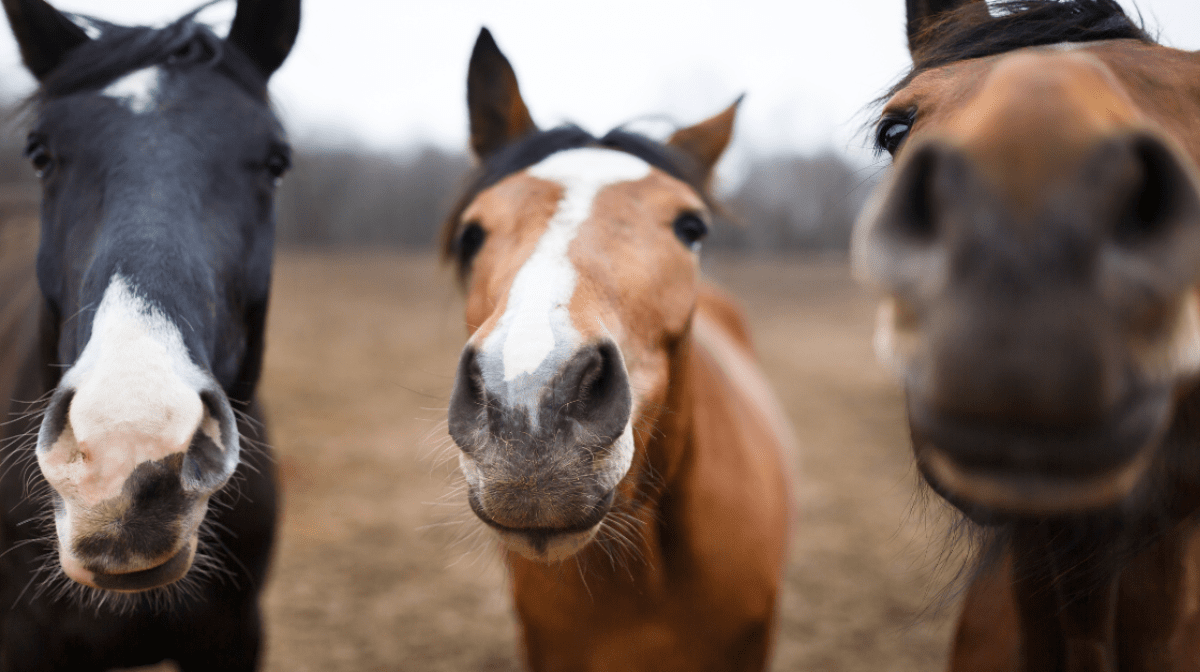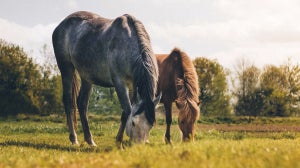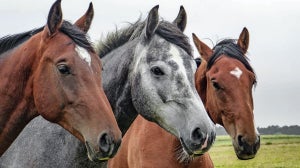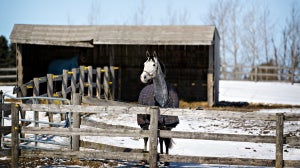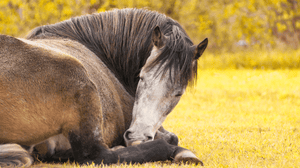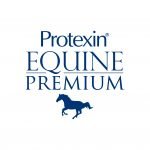
The equine gut is a complex system, responsible for breaking down food, absorbing nutrients, and eliminating waste. Poor gut health can lead to a variety of health problems for your horse, including weight loss, diarrhoea, colic, and even death.
But don’t worry, we’ve got tips to help you keep your horse’s gut health in top shape. On this page, we’ll discuss the equine gut, including how it works, what can happen when it isn’t functioning properly, and how you can support your horse's digestive system to keep it fit and healthy.
- Feed your horse plenty of fibre
- Reduce your horse’s stress
- Feed your horse little and often
- Maintain a consistent feeding schedule
- Make any changes to the diet slowly
- Feed according to the size, workload and temperament of the horse
- Provide clean and good quality forage only
- Make water constantly available
- Carry out regular dental checks
- Reduce grains and concentrate feed if you can
- Monitor worming status
1. Feed your horse plenty of fibre
Dietary fibre serves numerous roles within the digestive system. Its primary benefits manifest within the horse’s hindgut, where microorganisms, such as bacteria, harness the fibre to generate energy and essential nutrients like B vitamins.
These fibre-digesting bacteria play a pivotal role in maintaining horse gut health by inhibiting the growth of harmful bacterial species, while the breakdown of fibre yields heat and contributes to the horse's warmth.
We recommend adding high-fibre commercial feeds to your horse's dietary regime, incorporating components like beet pulp or soybean hulls. These fibre-rich feed options boast lower levels of starches and sugars in comparison to conventional grain-based feeds. And due to their similar digestion process to forage, they pose a reduced risk of inducing severe issues like gas colic or laminitis.
2. Reduce your horse’s stress
Environmental stressors can affect not only the horse's digestive system but also the composition and operation of the gut microbiome, which is a collection of tiny organisms living in the gut, and even the overall efficiency of digestion.
These stressors, which might include changes in the horse's living conditions, fluctuations in weather, altered feeding routines, and exposure to new or unsettling situations, can create a sort of chain reaction within the horse's body. This chain reaction can lead to disruptions in the normal functioning of the gastrointestinal system.
3. Feed your horse little and often
A horse's stomach is about the size of a rugby ball, holding between nine to fifteen litres, and can't handle large meals. To ensure effective digestion, it's important to feed your horse smaller portions more frequently.
If you give your horse an excessive amount of concentrated feed all at once, it moves through the digestive system more quickly, leaving less time for nutrient absorption. Not only does this increase the risk of digestive issues, but it can also be wasteful in terms of money spent on feed.
Remember that grains, especially sweet feeds, contain high levels of sugars and starches. Consuming too much of these sugars and starches can disrupt the balance of microorganisms in your horse’s hindgut, which is naturally adapted to digest grass.
This imbalance can lead to the production of gas, causing discomfort and potentially resulting in colic. What's even worse, an excess of sugars and starches can trigger laminitis, a serious inflammation of the soft tissues within your horse's hoof.
4. Maintain a consistent feeding schedule
One of the easiest ways to maintain your horse’s gut health is to maintain a consistent feeding schedule for your horse every day. The bacteria in your horse's digestive system flourish when the environment remains stable, while abrupt alterations to the diet can lead to the decline of these bacteria, as their living conditions become less favourable.
Consequently, this can lead to the generation of harmful substances that might contribute to issues like colic.
5. Make any changes to the diet slowly
When adjusting your horse's diet, it's essential to introduce any changes gradually. This approach allows your horse’s gut microbiome, the collection of microorganisms in the digestive system, to adapt to the new food sources over time. By doing so, you significantly lower the chances of potential complications like colic and the production of harmful toxins.
6. Feed according to the size, workload and temperament of the horse
Taking the time to accurately weigh both the hay and the horse offers valuable insights, helping to promote your horse’s overall health and performance by addressing their unique nutritional requirements.
One common problem for leisure horses in the UK is being too heavy, which can lead to poor horse gut health and an increase in the risk of laminitis. It's essential to keep an eye on how much fat your horse has, especially if they might be prone to laminitis or other metabolic conditions.
We recommend aiming for a body fat score of 2.5 out of 5, especially if your horse has EMS or PPID. To do this, you might need to adjust how much time they spend on pasture and how much food they eat throughout the year.
7. Provide clean and good quality forage only
Hay for horses should be free of dust, mould, and long, hard stems. This can help prevent digestive upset and reduce the risk of ingesting potential disease-causing microorganisms. If the hay has a lot of sticks, you can feed your horse a little extra so they can work around the parts they don't want.
When maintaining horse gut health, you ought to consider the impact of sandy soil. Horses can get sand colic if they live in areas with sandy soil, because they can ingest sand while grazing or eating from the ground. The sand can settle in the intestines and build up over time, blocking the passage of food and causing painful colic.
There are a few things you can do to help prevent sand colic in your horse. First, try to minimise their exposure to sand. This means feeding them hay in a feeder or net, or feeding them from a rubber stable mat. You can also give your horse psyllium husks, which can help to bind the sand and prevent it from accumulating in the intestines.
8. Make water constantly available
Your horse needs to have fresh, clean water available to them at all times to avoid dehydration. The water should be neither too hot nor too cold, and it should never be frozen. Bear in mind that horses are made up of around two-thirds water, and typically drink up to 45 litres of water per day.
Encourage your horse to drink plenty of water, especially after exercise. This will help to keep their digestive system running smoothly. But if your horse doesn’t drink enough water, they’re more likely to develop an impaction, which can be a serious condition for your horse’s gut health.
Soaking feeds such as Dengie Alfa-Beet can be a helpful way to increase water intake for horses that don’t drink as much water in the winter, or when travelling and competing. The highly digestible fibre in these feeds releases water readily in the digestive tract.
9. Carry out regular dental checks
Your horse needs to chew its food properly in order to digest it properly. As horses age, they’re more likely to suffer from dental problems and lose teeth. This can make it difficult for them to chew their food, which can compromise their digestion and overall health.
It’s important to ensure that horses with poor dentition have access to fibre that they can chew easily. Fibre is essential for horse gut health, and it can help to keep your horse's digestive systems running smoothly.
If your horse has poor dentition, you ought to give them these easy-to-chew, fibre-rich foods:
- Soaking hay – softer and easier to chew.
- Chopped hay – easier to chew than long strands of hay.
- Hay cubes – a good option for horses with very poor dentition.
- Beet pulp – a high-fibre feed that can be soaked or fed dry.
- Complete feeds – formulated to provide all the nutrients that horses need, and they are often easy to chew.
10. Reduce grains and concentrate feed if you can
Many horses and ponies don’t need as much carbohydrate as is commonly fed to them. This can lead to a number of health problems, including obesity, laminitis, insulin resistance, and metabolic syndrome.
Meanwhile, overloading your horse’s digestive system with energy-dense feeds can also lead to digestive upset, such as colic. To avoid these problems, we recommend feeding your horses a diet low in carbohydrates and high in fibre.
11. Monitor worming status
When it comes to maintaining gut health for horses, you also need to consider parasites. They can have a significant impact on your horse's overall digestive health, causing things like colic, weight loss, anaemia or even death.
It’s important to check your horse's manure for parasites on a regular basis, which can be done by a veterinarian or a qualified equine parasite control technician. Faecal egg counts (FECs) are the most common way to check for parasites, while a tapeworm test can also help you detect worms.
Here are some tips for preventing parasites in your horse:
- Keep your horse's pasture clean and free of manure.
- Rotate pastures regularly.
- Provide your horse with access to fresh water at all times.
- Deworm your horse regularly (as advised by your veterinary surgeon).
We hope you found this guide for maintaining gut health for your horse helpful. If you want to learn more about how to vaccinate your horse, or knowing equine first-aid, then we have you covered with our knowledge guides.

